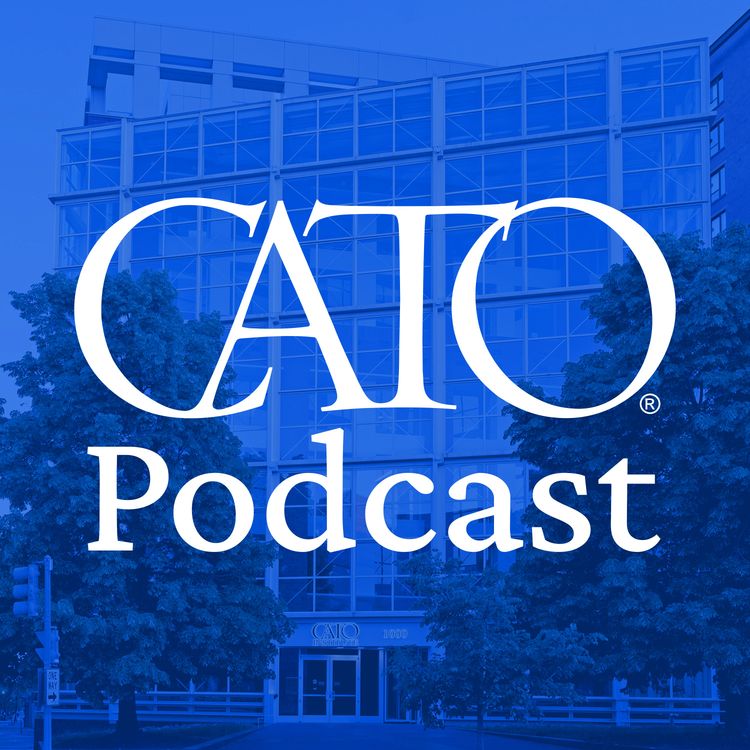Share

Cato Podcast
The Political Opposition to Prescribing Psychologists
•
An emergent turf war over who gets to prescribe medication means delaying mental health care. Claudia Mosier is a prescribing psychologist in two states and believes what she's offering could help many Americans secure their own mental health.
More episodes
View all episodes

67. Who Decides When America Goes to War?
36:12||Ep. 67Cato’s Katherine Thompson sits down with Matt Duss of the Center for International Policy to examine the persistent conflict between Congress and the presidency over war powers. From potential military action against Iran to past debates over Yemen and Venezuela, they explore how successive administrations have expanded executive authority and why Congress has struggled to reclaim its constitutional role.
66. No Tax on Tips, New Tax on Billionaires?
41:24||Ep. 66Ryan Bourne sits down with Cato’s Adam Michel to unpack what the 2026 tax year will bring, including new provisions commonly described as “no tax on tips” and “no tax on overtime." They also explore the economics of California's billionaire tax ballot initiative, and whether Trump Accounts are a good savings vehicle.
65. Ed Crane and the Ideas That Changed Washington — and the World
35:42||Ep. 65From organizing pioneering conferences in China and the Soviet Union to insisting on rigorous scholarship and principled advocacy, Ed Crane brought classical liberal ideas into mainstream policy debates. Ian Vásquez, Jim Dorn, and Aaron Steelman share firsthand stories about Cato’s growth, Crane’s strategic vision, and the long-term approach that shaped debates on markets, foreign policy, and individual liberty around the world.
64. Raging Against Modernity
40:48||Ep. 64A new ideology is gaining influence on the American right: postliberalism. In this episode, Cato Institute economist Ryan Bourne speaks with Phil Magness of the Independent Institute about what postliberalism is, where it came from, and why it matters in today’s political debates.They explore the key thinkers and personalities behind the postliberal movement, its critique of classical liberalism, and its views on executive power, the American founding, constitutionalism, and contemporary public policy. The conversation examines how postliberal ideas are shaping modern conservatism and what they could mean for the future of American politics.
63. Why Globalization Wins on the Field
38:31||Ep. 63Cato’s Scott Lincicome sits down with Washington Post editorial writer Dominic Pino to explore what professional sports reveal about trade, immigration, and competition. From a talent-filled, globe-spanning World Series to the NHL’s influx of Soviet and Russian players, they show how “imports” raise quality, delight consumers, and expose the contradictions in protectionist thinking.
62. Protest, Carry, Die: Rights in Conflict
39:47||Ep. 62As debates over gun rights intensify, recent shootings in Minnesota reveal how quickly constitutional protections can unravel in practice. Cato's Clark Neily and Matthew Cavedon discuss the dangers of treating firearms as intrinsic hazards, the hypocrisy of selective Second Amendment support, and why protecting unpopular speakers and armed protesters is essential to preserving civil liberties for everyone.
61. Reforming the Federal Reserve, Brick by Brick
27:58||Ep. 61For more than a century, the Federal Reserve has accumulated responsibilities far beyond monetary policy, from bank regulation to payments and emergency lending. The Cato Institute's Nick Anthony, Norbert Michel, and Jai Kedia break down what the Fed actually controls, what it does not, and why inflation, debt, and financial instability cannot be fixed by interest-rate tweaks alone.
60. Why Propping Up Maduro’s Allies Won’t Save Venezuela
29:47||Ep. 60After more than two decades of socialist rule, Venezuela faces a rare opportunity for democratic transition following Maduro’s removal. Ian Vásquez and Marcos Falcone trace the regime’s record of repression and economic collapse, explain why regime insiders cannot credibly deliver reform, and make the case for immediate engagement with María Corina Machado and the opposition that overwhelmingly won the 2024 election.
59. History Makes Clear: School Choice Is Necessary in a Diverse Society
50:51||Ep. 59Cato’s Neal McCluskey is joined by Cheryl Fields-Smith, Matthew Lee, and Ron Matus to discuss the new book Fighting for the Freedom to Learn and the centuries-long movement for school choice in America. They challenge the myth that school choice is a modern or partisan project, showing how diverse communities, religious groups, progressives, and parents have long sought pluralistic education options, which is the only way to deliver education consistent with a free and diverse society.